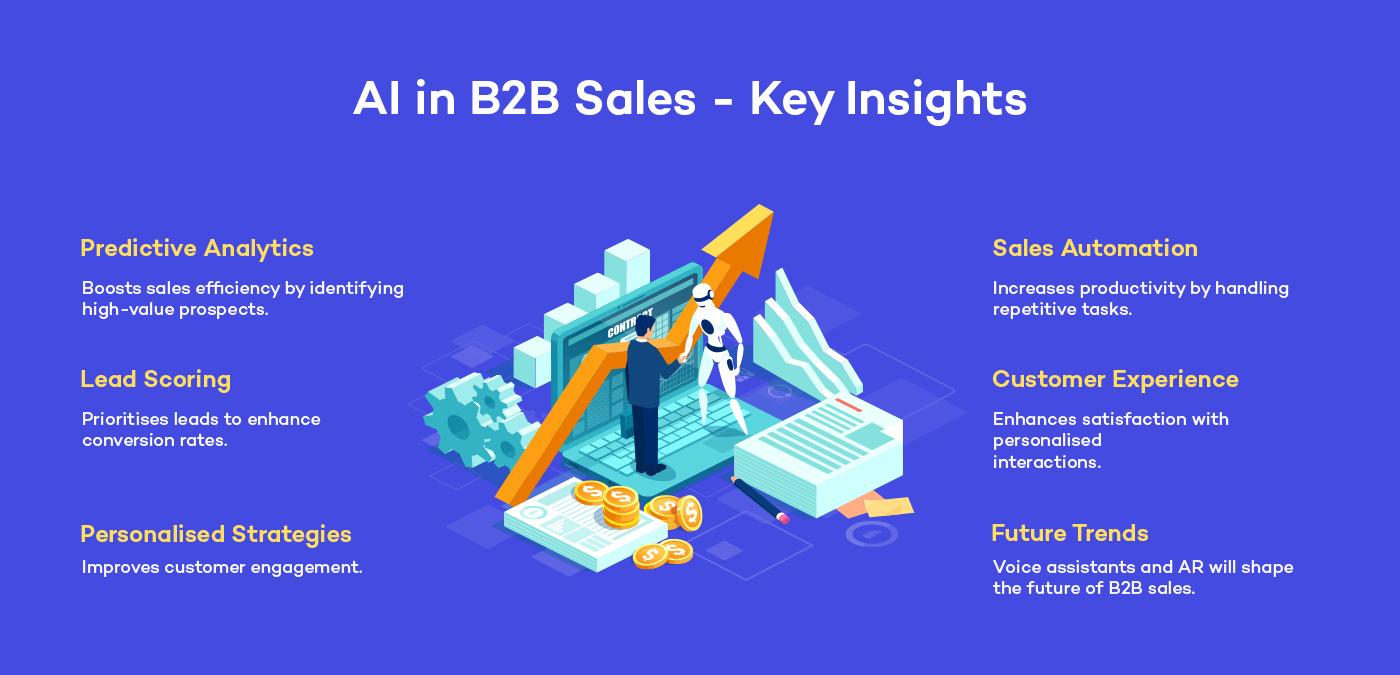The Future of B2B: Harnessing AI Automation to Drive Success
The landscape of B2B is shifting as companies progressively transform to AI automation for tactical benefit. This transformation guarantees to improve efficiency and consumer engagement via sophisticated technologies. Nonetheless, the integration of these devices is not without its obstacles. Recognizing just how businesses can navigate this advancing surface will certainly be necessary for future success. What factors will establish the efficiency of AI in this industry? The solutions may redefine traditional company models.
Recognizing AI Automation in B2B
As services significantly look for performance, comprehending AI automation in B2B becomes vital. AI automation refers to the use of synthetic knowledge modern technologies to improve and improve organization processes. In the B2B market, this involves the integration of AI devices to take care of tasks such as information evaluation, consumer interactions, and supply chain operations. By leveraging maker discovering and all-natural language processing, business can enhance precision, decrease human mistake, and accelerate decision-making (Minarik AI). Additionally, AI automation assists in the handling of huge quantities of information, making it possible for organizations to remove useful understandings and maximize their operations. As organizations navigate this technical landscape, an extensive grip of AI automation's capabilities will equip them to remain receptive and affordable to market needs
Trick Benefits of AI Automation for Services
While numerous services face increasing functional needs, AI automation provides various advantages that can considerably boost their performance. One considerable advantage is performance; AI systems can perform repeated tasks faster and with higher accuracy than human beings, thus lowering errors and freeing up staff members for even more calculated efforts. Furthermore, AI automation makes it possible for data-driven decision-making by assessing vast datasets rapidly, providing insights that inform service techniques. Price reduction is one more key benefit, as automation lessens labor prices and enhances source appropriation. In addition, AI can improve scalability, enabling organizations to adjust to market modifications swiftly. Inevitably, the assimilation of AI automation fosters innovation, allowing companies to continue to be competitive in a swiftly progressing landscape.
Transforming Customer Experiences With AI
AI is improving consumer experiences by improving and making it possible for personalized communications interaction. With the application of anticipating analytics, businesses can prepare for customer demands and choices, leading to a lot more customized services. In addition, streamlining assistance procedures with AI modern technology enhances effectiveness and satisfaction, eventually changing the general consumer trip.
Customized Communications and Interaction
Customized interactions have come to be a cornerstone of efficient client involvement in the B2B landscape. By leveraging AI-driven options, companies can tailor their communication and offerings to meet the one-of-a-kind demands of each customer. Automated systems assess customer data, preferences, and actions, making it possible for companies to create tailored experiences that reverberate with their target market. This degree of customization not just improves consumer contentment yet likewise promotes long-lasting commitment. Additionally, AI tools facilitate real-time communications, permitting organizations to react immediately and efficiently to queries and responses. Consequently, companies can construct stronger connections with clients, making sure that their services straighten with evolving assumptions. Inevitably, tailored involvement through AI brings about enhanced results and sustained success in the affordable B2B market.
Anticipating Analytics Application
As businesses increasingly seek to boost customer experiences, carrying out predictive analytics has actually arised as a critical approach in the B2B industry. By leveraging data-driven insights, companies can anticipate client requirements and choices, enabling them to tailor their offerings better. Anticipating analytics makes use of sophisticated formulas and historical information to anticipate future behaviors, permitting organizations to determine possible difficulties and possibilities. This aggressive technique not just boosts customer contentment but additionally fosters commitment by supplying timely and appropriate options. Furthermore, predictive analytics aids in resource allotment, making sure that marketing initiatives are focused on high-value prospects. Ultimately, the combination of anticipating analytics outfits B2B business with the tools necessary to change client interactions and drive long-lasting success in an increasingly competitive landscape.
Enhancing Support Procedures
Enhancing customer experiences in the B2B industry expands past predictive analytics; streamlining assistance processes plays a vital function. By integrating AI-driven services, businesses can improve and automate regular inquiries reaction times, resulting in enhanced client contentment. Chatbots and virtual aides provide 24/7 support, dealing with customer requires without delay and decreasing the problem on human representatives. This automation enables teams to concentrate on intricate concerns, fostering more significant interactions. AI devices can examine support information to identify trends and locations for improvement, making certain continuous enhancement of solution top quality. As organizations adopt these technologies, they place themselves as responsive and customer-centric, ultimately driving commitment and business development in an increasingly affordable landscape.
Improving Workflow and Processes
Improving procedures and procedures in B2B environments is important for boosting overall effectiveness. By optimizing process performance and automating routine jobs, organizations can minimize manual mistakes and liberate valuable sources. This change not just boosts efficiency but likewise makes it possible for groups to concentrate on calculated initiatives that drive growth.
Enhancing Workflow Efficiency
Enhancing process effectiveness is crucial for organizations looking for to minimize operational prices and boost productivity. By analyzing existing procedures, companies can identify bottlenecks and redundancies that hinder efficiency. Executing streamlined treatments boosts communication and cooperation among groups, guaranteeing that jobs are completed extra swiftly. Making use of data-driven understandings enables business to make enlightened decisions that refine operations better. In addition, adopting integrated innovations can facilitate seamless info flow, decreasing the danger of hold-ups and errors. As companies embrace these changes, they not just promote an extra agile workplace but additionally place themselves to react promptly to market needs - Growth Systems For B2B. Inevitably, concentrating on process effectiveness enables organizations to assign resources efficiently, driving long-lasting success in a progressively affordable landscape
Automating Regular Tasks
Lots of organizations are increasingly transforming to automation to deal with routine tasks, identifying its possible to considerably improve operational performance. By deploying AI-driven options, companies can enhance repeated activities such as data entrance, invoice processing, and client inquiries. This change not only reduces human mistake but likewise liberates useful worker time, enabling team to concentrate on value-added tasks and strategic initiatives. Additionally, automation can enhance feedback times and solution uniformity, bring about improved consumer complete satisfaction. As businesses navigate a competitive landscape, leveraging automation for regular tasks ends up being necessary for keeping and optimizing process dexterity. Ultimately, this technique fosters advancement and drives development, positioning organizations for long-lasting success in the advancing B2B environment.
Enhancing Decision-Making Through Data Insights

Getting Over Obstacles in AI Implementation
Although AI application holds the assurance of substantial functional renovations, organizations usually face a myriad of challenges that can impede development. Trick challenges include data top quality issues, as lots of ventures fight with incomplete or irregular datasets necessary for reliable AI training. Furthermore, resistance to transform within the labor force can impede the fostering of AI modern technologies, as workers might fear work displacement or lack the needed abilities. Budget plan restraints also provide an obstacle, restricting investment in the required facilities and ability. Furthermore, incorporating AI systems with existing procedures can be intricate, requiring significant time and resources. Overcoming these difficulties requires a strategic method that includes detailed training, adjustment monitoring, and a commitment to constant enhancement in AI initiatives.
Future Trends: The Following Frontier in B2B Automation
While the landscape of B2B automation remains to evolve, arising fads are poised to redefine how organizations run. The integration of innovative expert system will help with extra tailored customer experiences, allowing companies to customize options precisely to customer needs. The rise of anticipating analytics will certainly allow companies to prepare for market shifts and enhance decision-making procedures. Automation of regular tasks through robotic process automation (RPA) will certainly boost efficiency, minimizing functional costs significantly. In addition, the fostering of blockchain technology promises enhanced openness and safety and security in deals. As these technologies gain grip, firms will significantly take advantage of AI-driven insights to cultivate collaboration, streamline supply chains, and enhance total efficiency, marking a transformative shift in the B2B landscape.
Regularly Asked Inquiries
What Sorts Of Organizations Can Benefit Most From AI Automation?
Manufacturing, logistics, and client service businesses can profit most from AI automation. These markets improve operational effectiveness, decrease prices, and enhance customer communications, eventually bring about boosted performance and profitability in an affordable market.
How Can Local Business Execute AI Automation Properly?
Little organizations can execute AI automation properly by recognizing repetitive tasks, selecting user-friendly tools, making certain ample training for employees, and gradually integrating options to enhance process while keeping an eye on performance and readjusting strategies based upon responses.
What Are Common Misconceptions Concerning AI in B2B?
Usual false impressions concerning AI in B2B consist of the idea that it is only for huge business, that it ensures instant results, and that it can fully change human decision-making rather than enhancing it. AI Automation For B2B.
Exactly How Does AI Automation Effect Worker Roles and Work Safety And Security?
AI automation improves employee functions by simplifying repetitive tasks, promoting performance and innovation. While some concern job loss, it frequently creates chances for upskilling and new positions, eventually boosting task safety and security via included value and efficiency.
What Abilities Are Required to Take Care Of AI Automation Projects?

As businesses increasingly look for effectiveness, recognizing AI automation in B2B ends up being vital. AI automation assists in the handling of big volumes of information, making it possible for services to extract valuable understandings and optimize their procedures. While lots of organizations grapple with boosting operational demands, AI automation offers many benefits that can markedly boost their performance. Automation of regular tasks with robot process automation (RPA) will certainly improve efficiency, reducing operational costs considerably. Manufacturing, logistics, and customer service organizations can benefit most from AI automation.